International Management: Cultural Differences and Expatriate Success
VerifiedAdded on 2023/01/05
|12
|3671
|31
Report
AI Summary
This report on international management delves into the critical aspects of globalization and its impact on businesses. It examines how cultural similarities and differences, as identified through Hofstede's model, affect business operations across various countries, specifically comparing the UK with Japan, Brazil, and Germany. The report analyzes the influence of cultural dimensions on operational management, leadership styles, and HR and marketing practices within these different cultural contexts. Furthermore, it discusses the role and importance of expatriates in global business, detailing the factors contributing to expatriate failure, such as family issues and cultural shock, and the strategies that maximize their success, including proper selection, training, and support. The report also touches upon the principles and strategies followed by organizations in different countries and highlights how cultural nuances influence these elements, providing a comprehensive view of international management challenges and opportunities.
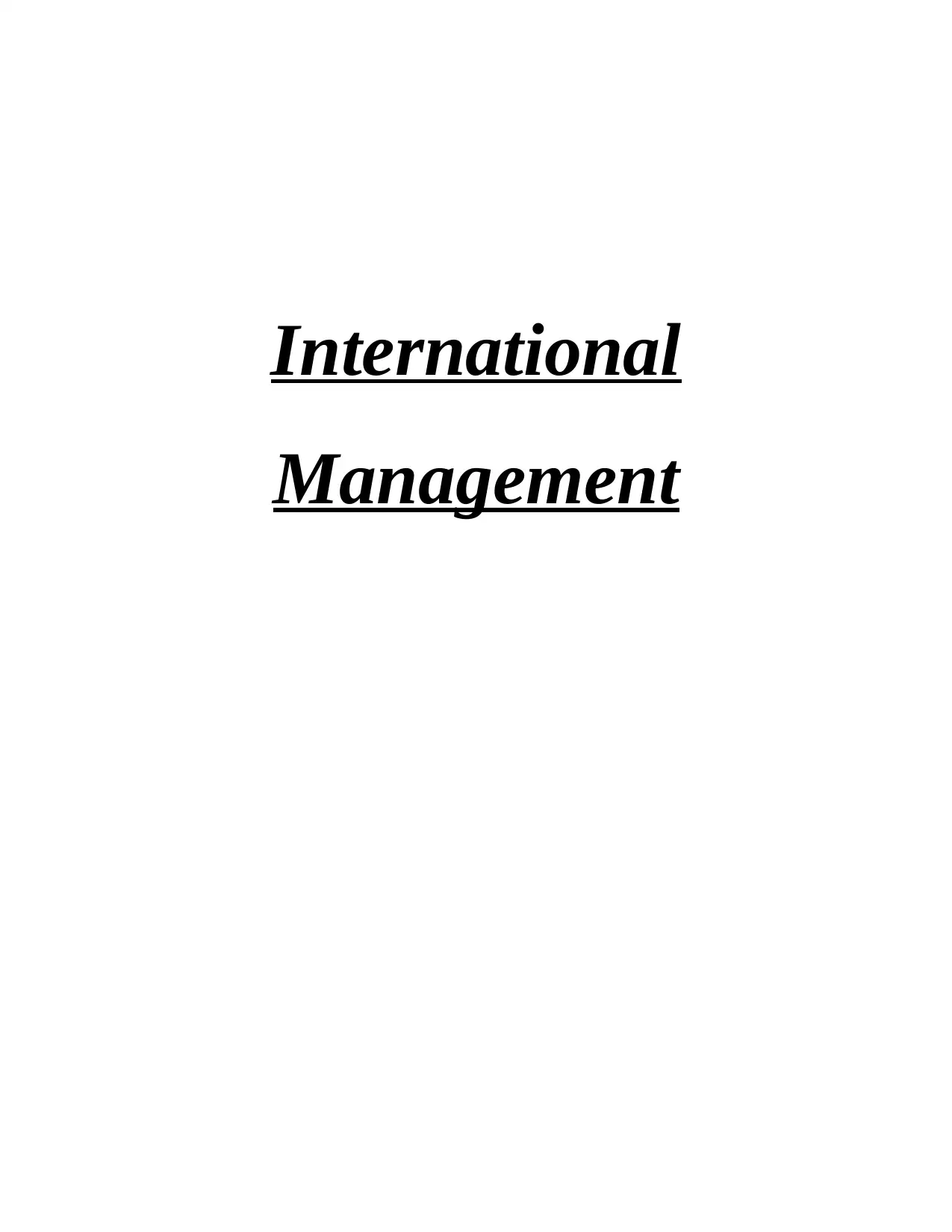
International
Management
Management
Paraphrase This Document
Need a fresh take? Get an instant paraphrase of this document with our AI Paraphraser
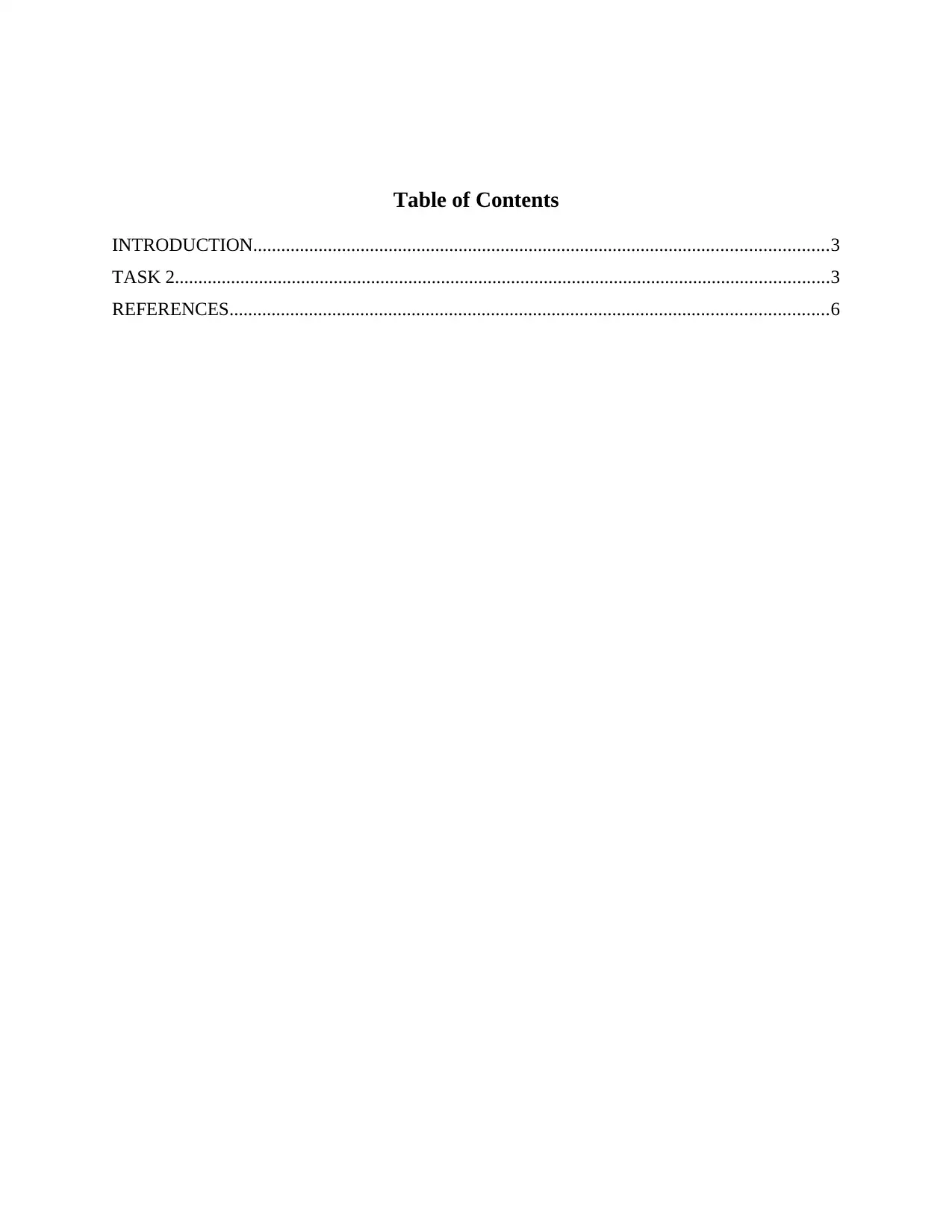
Table of Contents
INTRODUCTION...........................................................................................................................3
TASK 2............................................................................................................................................3
REFERENCES................................................................................................................................6
INTRODUCTION...........................................................................................................................3
TASK 2............................................................................................................................................3
REFERENCES................................................................................................................................6
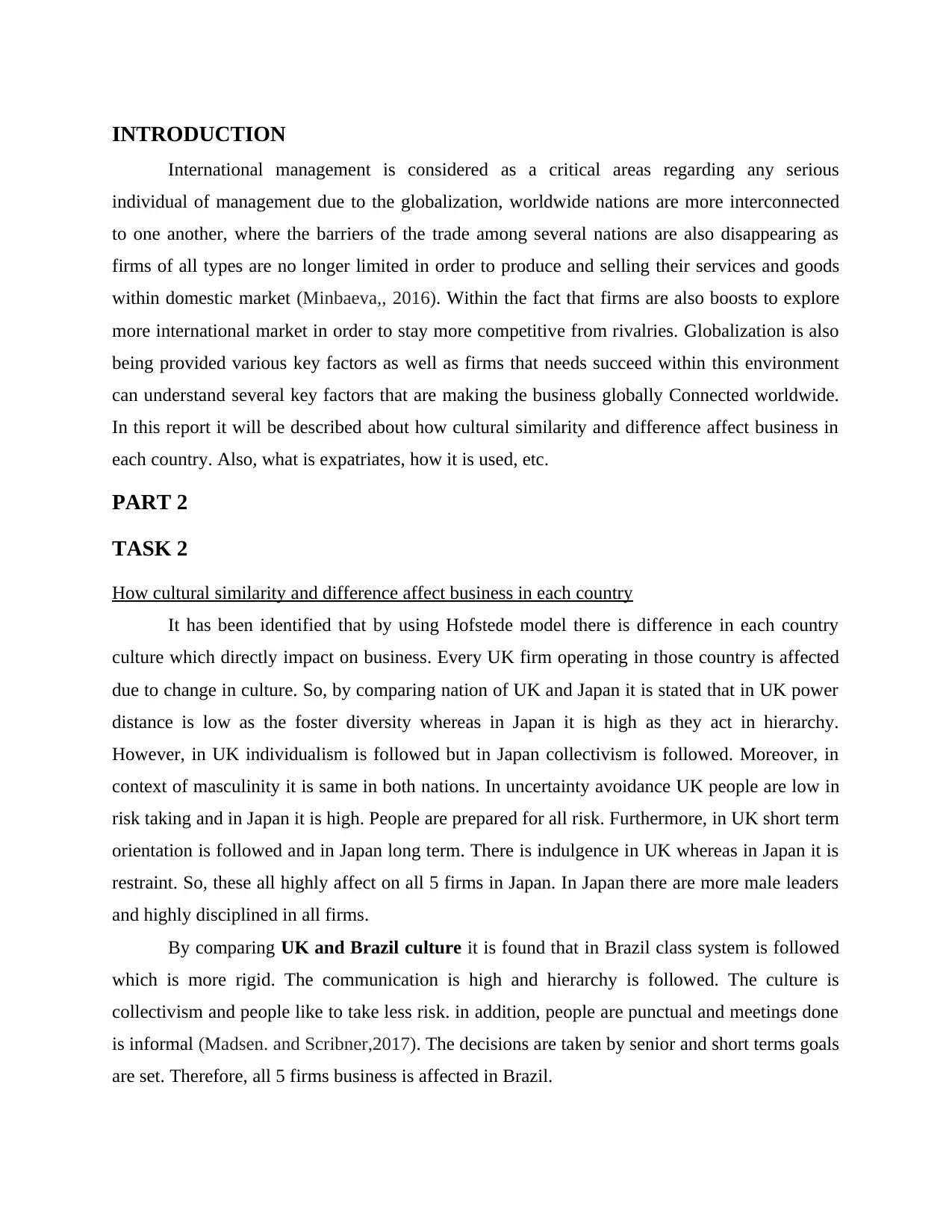
INTRODUCTION
International management is considered as a critical areas regarding any serious
individual of management due to the globalization, worldwide nations are more interconnected
to one another, where the barriers of the trade among several nations are also disappearing as
firms of all types are no longer limited in order to produce and selling their services and goods
within domestic market (Minbaeva,, 2016). Within the fact that firms are also boosts to explore
more international market in order to stay more competitive from rivalries. Globalization is also
being provided various key factors as well as firms that needs succeed within this environment
can understand several key factors that are making the business globally Connected worldwide.
In this report it will be described about how cultural similarity and difference affect business in
each country. Also, what is expatriates, how it is used, etc.
PART 2
TASK 2
How cultural similarity and difference affect business in each country
It has been identified that by using Hofstede model there is difference in each country
culture which directly impact on business. Every UK firm operating in those country is affected
due to change in culture. So, by comparing nation of UK and Japan it is stated that in UK power
distance is low as the foster diversity whereas in Japan it is high as they act in hierarchy.
However, in UK individualism is followed but in Japan collectivism is followed. Moreover, in
context of masculinity it is same in both nations. In uncertainty avoidance UK people are low in
risk taking and in Japan it is high. People are prepared for all risk. Furthermore, in UK short term
orientation is followed and in Japan long term. There is indulgence in UK whereas in Japan it is
restraint. So, these all highly affect on all 5 firms in Japan. In Japan there are more male leaders
and highly disciplined in all firms.
By comparing UK and Brazil culture it is found that in Brazil class system is followed
which is more rigid. The communication is high and hierarchy is followed. The culture is
collectivism and people like to take less risk. in addition, people are punctual and meetings done
is informal (Madsen. and Scribner,2017). The decisions are taken by senior and short terms goals
are set. Therefore, all 5 firms business is affected in Brazil.
International management is considered as a critical areas regarding any serious
individual of management due to the globalization, worldwide nations are more interconnected
to one another, where the barriers of the trade among several nations are also disappearing as
firms of all types are no longer limited in order to produce and selling their services and goods
within domestic market (Minbaeva,, 2016). Within the fact that firms are also boosts to explore
more international market in order to stay more competitive from rivalries. Globalization is also
being provided various key factors as well as firms that needs succeed within this environment
can understand several key factors that are making the business globally Connected worldwide.
In this report it will be described about how cultural similarity and difference affect business in
each country. Also, what is expatriates, how it is used, etc.
PART 2
TASK 2
How cultural similarity and difference affect business in each country
It has been identified that by using Hofstede model there is difference in each country
culture which directly impact on business. Every UK firm operating in those country is affected
due to change in culture. So, by comparing nation of UK and Japan it is stated that in UK power
distance is low as the foster diversity whereas in Japan it is high as they act in hierarchy.
However, in UK individualism is followed but in Japan collectivism is followed. Moreover, in
context of masculinity it is same in both nations. In uncertainty avoidance UK people are low in
risk taking and in Japan it is high. People are prepared for all risk. Furthermore, in UK short term
orientation is followed and in Japan long term. There is indulgence in UK whereas in Japan it is
restraint. So, these all highly affect on all 5 firms in Japan. In Japan there are more male leaders
and highly disciplined in all firms.
By comparing UK and Brazil culture it is found that in Brazil class system is followed
which is more rigid. The communication is high and hierarchy is followed. The culture is
collectivism and people like to take less risk. in addition, people are punctual and meetings done
is informal (Madsen. and Scribner,2017). The decisions are taken by senior and short terms goals
are set. Therefore, all 5 firms business is affected in Brazil.
⊘ This is a preview!⊘
Do you want full access?
Subscribe today to unlock all pages.

Trusted by 1+ million students worldwide
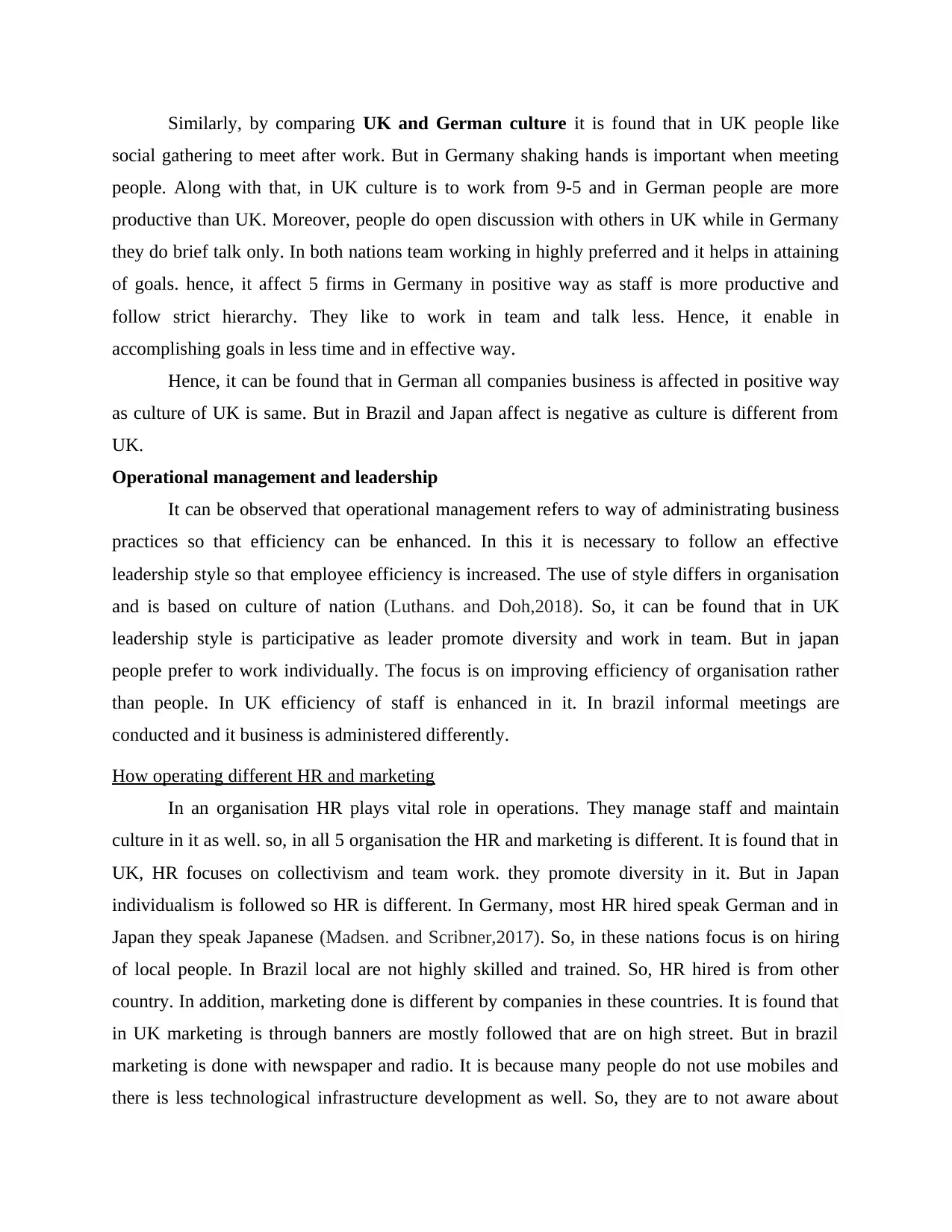
Similarly, by comparing UK and German culture it is found that in UK people like
social gathering to meet after work. But in Germany shaking hands is important when meeting
people. Along with that, in UK culture is to work from 9-5 and in German people are more
productive than UK. Moreover, people do open discussion with others in UK while in Germany
they do brief talk only. In both nations team working in highly preferred and it helps in attaining
of goals. hence, it affect 5 firms in Germany in positive way as staff is more productive and
follow strict hierarchy. They like to work in team and talk less. Hence, it enable in
accomplishing goals in less time and in effective way.
Hence, it can be found that in German all companies business is affected in positive way
as culture of UK is same. But in Brazil and Japan affect is negative as culture is different from
UK.
Operational management and leadership
It can be observed that operational management refers to way of administrating business
practices so that efficiency can be enhanced. In this it is necessary to follow an effective
leadership style so that employee efficiency is increased. The use of style differs in organisation
and is based on culture of nation (Luthans. and Doh,2018). So, it can be found that in UK
leadership style is participative as leader promote diversity and work in team. But in japan
people prefer to work individually. The focus is on improving efficiency of organisation rather
than people. In UK efficiency of staff is enhanced in it. In brazil informal meetings are
conducted and it business is administered differently.
How operating different HR and marketing
In an organisation HR plays vital role in operations. They manage staff and maintain
culture in it as well. so, in all 5 organisation the HR and marketing is different. It is found that in
UK, HR focuses on collectivism and team work. they promote diversity in it. But in Japan
individualism is followed so HR is different. In Germany, most HR hired speak German and in
Japan they speak Japanese (Madsen. and Scribner,2017). So, in these nations focus is on hiring
of local people. In Brazil local are not highly skilled and trained. So, HR hired is from other
country. In addition, marketing done is different by companies in these countries. It is found that
in UK marketing is through banners are mostly followed that are on high street. But in brazil
marketing is done with newspaper and radio. It is because many people do not use mobiles and
there is less technological infrastructure development as well. So, they are to not aware about
social gathering to meet after work. But in Germany shaking hands is important when meeting
people. Along with that, in UK culture is to work from 9-5 and in German people are more
productive than UK. Moreover, people do open discussion with others in UK while in Germany
they do brief talk only. In both nations team working in highly preferred and it helps in attaining
of goals. hence, it affect 5 firms in Germany in positive way as staff is more productive and
follow strict hierarchy. They like to work in team and talk less. Hence, it enable in
accomplishing goals in less time and in effective way.
Hence, it can be found that in German all companies business is affected in positive way
as culture of UK is same. But in Brazil and Japan affect is negative as culture is different from
UK.
Operational management and leadership
It can be observed that operational management refers to way of administrating business
practices so that efficiency can be enhanced. In this it is necessary to follow an effective
leadership style so that employee efficiency is increased. The use of style differs in organisation
and is based on culture of nation (Luthans. and Doh,2018). So, it can be found that in UK
leadership style is participative as leader promote diversity and work in team. But in japan
people prefer to work individually. The focus is on improving efficiency of organisation rather
than people. In UK efficiency of staff is enhanced in it. In brazil informal meetings are
conducted and it business is administered differently.
How operating different HR and marketing
In an organisation HR plays vital role in operations. They manage staff and maintain
culture in it as well. so, in all 5 organisation the HR and marketing is different. It is found that in
UK, HR focuses on collectivism and team work. they promote diversity in it. But in Japan
individualism is followed so HR is different. In Germany, most HR hired speak German and in
Japan they speak Japanese (Madsen. and Scribner,2017). So, in these nations focus is on hiring
of local people. In Brazil local are not highly skilled and trained. So, HR hired is from other
country. In addition, marketing done is different by companies in these countries. It is found that
in UK marketing is through banners are mostly followed that are on high street. But in brazil
marketing is done with newspaper and radio. It is because many people do not use mobiles and
there is less technological infrastructure development as well. So, they are to not aware about
Paraphrase This Document
Need a fresh take? Get an instant paraphrase of this document with our AI Paraphraser
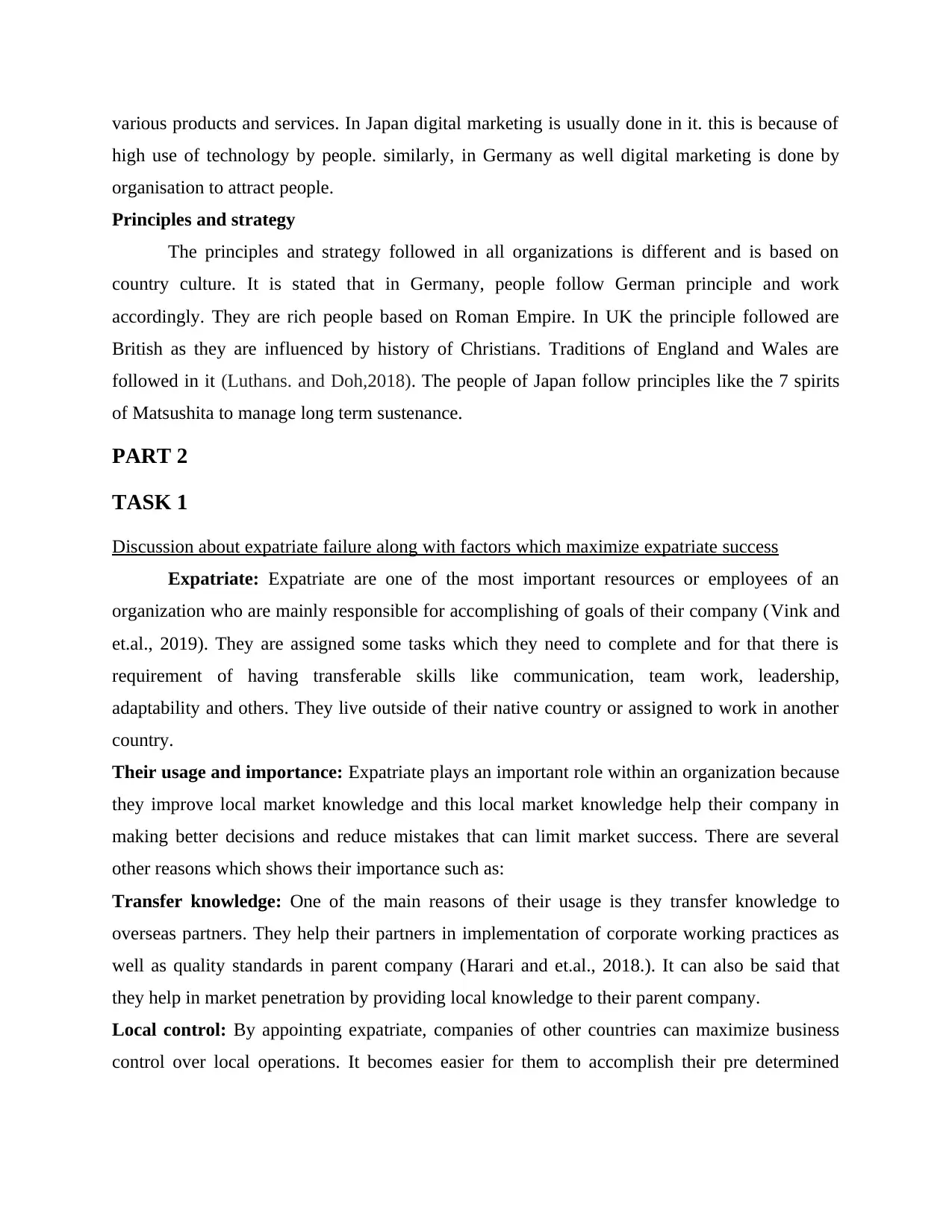
various products and services. In Japan digital marketing is usually done in it. this is because of
high use of technology by people. similarly, in Germany as well digital marketing is done by
organisation to attract people.
Principles and strategy
The principles and strategy followed in all organizations is different and is based on
country culture. It is stated that in Germany, people follow German principle and work
accordingly. They are rich people based on Roman Empire. In UK the principle followed are
British as they are influenced by history of Christians. Traditions of England and Wales are
followed in it (Luthans. and Doh,2018). The people of Japan follow principles like the 7 spirits
of Matsushita to manage long term sustenance.
PART 2
TASK 1
Discussion about expatriate failure along with factors which maximize expatriate success
Expatriate: Expatriate are one of the most important resources or employees of an
organization who are mainly responsible for accomplishing of goals of their company (Vink and
et.al., 2019). They are assigned some tasks which they need to complete and for that there is
requirement of having transferable skills like communication, team work, leadership,
adaptability and others. They live outside of their native country or assigned to work in another
country.
Their usage and importance: Expatriate plays an important role within an organization because
they improve local market knowledge and this local market knowledge help their company in
making better decisions and reduce mistakes that can limit market success. There are several
other reasons which shows their importance such as:
Transfer knowledge: One of the main reasons of their usage is they transfer knowledge to
overseas partners. They help their partners in implementation of corporate working practices as
well as quality standards in parent company (Harari and et.al., 2018.). It can also be said that
they help in market penetration by providing local knowledge to their parent company.
Local control: By appointing expatriate, companies of other countries can maximize business
control over local operations. It becomes easier for them to accomplish their pre determined
high use of technology by people. similarly, in Germany as well digital marketing is done by
organisation to attract people.
Principles and strategy
The principles and strategy followed in all organizations is different and is based on
country culture. It is stated that in Germany, people follow German principle and work
accordingly. They are rich people based on Roman Empire. In UK the principle followed are
British as they are influenced by history of Christians. Traditions of England and Wales are
followed in it (Luthans. and Doh,2018). The people of Japan follow principles like the 7 spirits
of Matsushita to manage long term sustenance.
PART 2
TASK 1
Discussion about expatriate failure along with factors which maximize expatriate success
Expatriate: Expatriate are one of the most important resources or employees of an
organization who are mainly responsible for accomplishing of goals of their company (Vink and
et.al., 2019). They are assigned some tasks which they need to complete and for that there is
requirement of having transferable skills like communication, team work, leadership,
adaptability and others. They live outside of their native country or assigned to work in another
country.
Their usage and importance: Expatriate plays an important role within an organization because
they improve local market knowledge and this local market knowledge help their company in
making better decisions and reduce mistakes that can limit market success. There are several
other reasons which shows their importance such as:
Transfer knowledge: One of the main reasons of their usage is they transfer knowledge to
overseas partners. They help their partners in implementation of corporate working practices as
well as quality standards in parent company (Harari and et.al., 2018.). It can also be said that
they help in market penetration by providing local knowledge to their parent company.
Local control: By appointing expatriate, companies of other countries can maximize business
control over local operations. It becomes easier for them to accomplish their pre determined
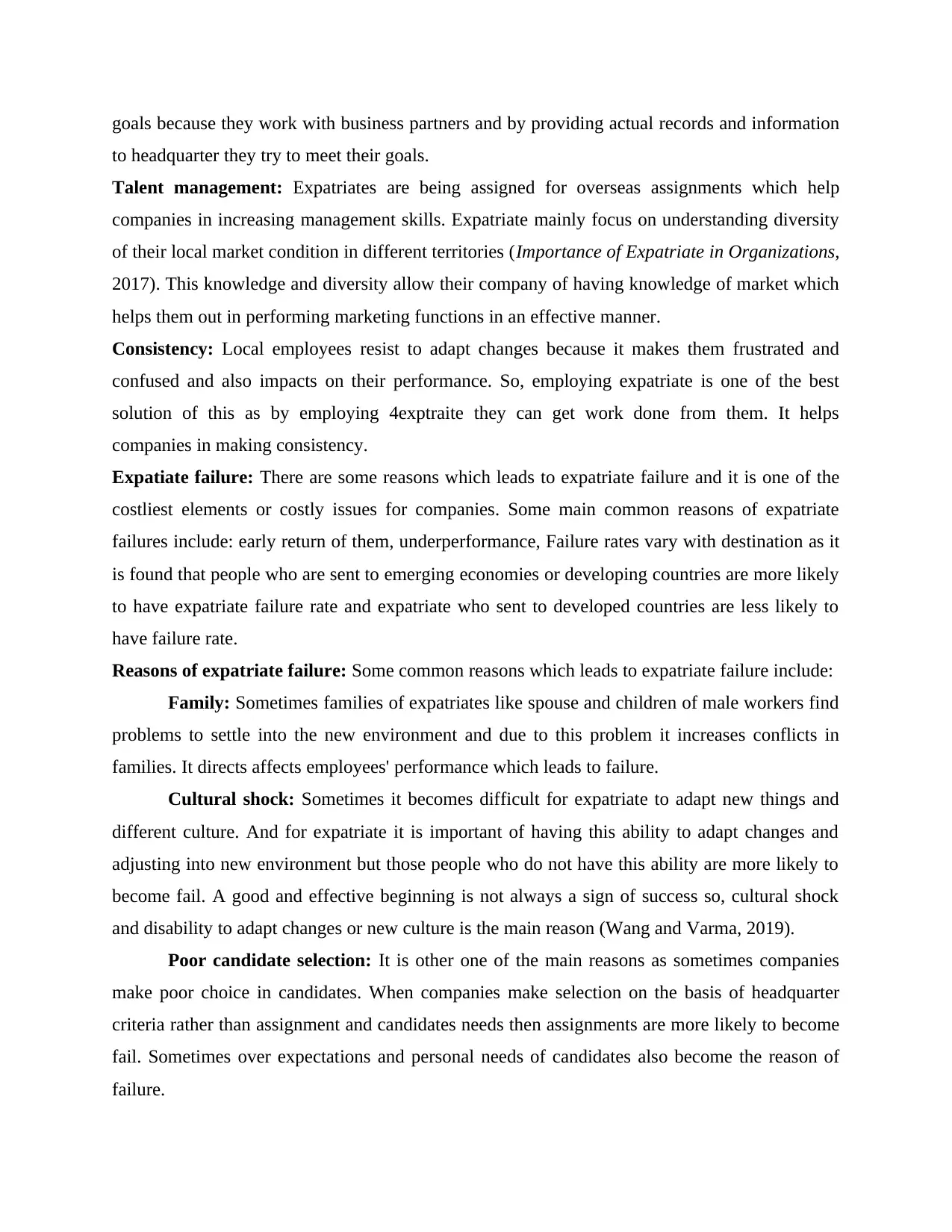
goals because they work with business partners and by providing actual records and information
to headquarter they try to meet their goals.
Talent management: Expatriates are being assigned for overseas assignments which help
companies in increasing management skills. Expatriate mainly focus on understanding diversity
of their local market condition in different territories (Importance of Expatriate in Organizations,
2017). This knowledge and diversity allow their company of having knowledge of market which
helps them out in performing marketing functions in an effective manner.
Consistency: Local employees resist to adapt changes because it makes them frustrated and
confused and also impacts on their performance. So, employing expatriate is one of the best
solution of this as by employing 4exptraite they can get work done from them. It helps
companies in making consistency.
Expatiate failure: There are some reasons which leads to expatriate failure and it is one of the
costliest elements or costly issues for companies. Some main common reasons of expatriate
failures include: early return of them, underperformance, Failure rates vary with destination as it
is found that people who are sent to emerging economies or developing countries are more likely
to have expatriate failure rate and expatriate who sent to developed countries are less likely to
have failure rate.
Reasons of expatriate failure: Some common reasons which leads to expatriate failure include:
Family: Sometimes families of expatriates like spouse and children of male workers find
problems to settle into the new environment and due to this problem it increases conflicts in
families. It directs affects employees' performance which leads to failure.
Cultural shock: Sometimes it becomes difficult for expatriate to adapt new things and
different culture. And for expatriate it is important of having this ability to adapt changes and
adjusting into new environment but those people who do not have this ability are more likely to
become fail. A good and effective beginning is not always a sign of success so, cultural shock
and disability to adapt changes or new culture is the main reason (Wang and Varma, 2019).
Poor candidate selection: It is other one of the main reasons as sometimes companies
make poor choice in candidates. When companies make selection on the basis of headquarter
criteria rather than assignment and candidates needs then assignments are more likely to become
fail. Sometimes over expectations and personal needs of candidates also become the reason of
failure.
to headquarter they try to meet their goals.
Talent management: Expatriates are being assigned for overseas assignments which help
companies in increasing management skills. Expatriate mainly focus on understanding diversity
of their local market condition in different territories (Importance of Expatriate in Organizations,
2017). This knowledge and diversity allow their company of having knowledge of market which
helps them out in performing marketing functions in an effective manner.
Consistency: Local employees resist to adapt changes because it makes them frustrated and
confused and also impacts on their performance. So, employing expatriate is one of the best
solution of this as by employing 4exptraite they can get work done from them. It helps
companies in making consistency.
Expatiate failure: There are some reasons which leads to expatriate failure and it is one of the
costliest elements or costly issues for companies. Some main common reasons of expatriate
failures include: early return of them, underperformance, Failure rates vary with destination as it
is found that people who are sent to emerging economies or developing countries are more likely
to have expatriate failure rate and expatriate who sent to developed countries are less likely to
have failure rate.
Reasons of expatriate failure: Some common reasons which leads to expatriate failure include:
Family: Sometimes families of expatriates like spouse and children of male workers find
problems to settle into the new environment and due to this problem it increases conflicts in
families. It directs affects employees' performance which leads to failure.
Cultural shock: Sometimes it becomes difficult for expatriate to adapt new things and
different culture. And for expatriate it is important of having this ability to adapt changes and
adjusting into new environment but those people who do not have this ability are more likely to
become fail. A good and effective beginning is not always a sign of success so, cultural shock
and disability to adapt changes or new culture is the main reason (Wang and Varma, 2019).
Poor candidate selection: It is other one of the main reasons as sometimes companies
make poor choice in candidates. When companies make selection on the basis of headquarter
criteria rather than assignment and candidates needs then assignments are more likely to become
fail. Sometimes over expectations and personal needs of candidates also become the reason of
failure.
⊘ This is a preview!⊘
Do you want full access?
Subscribe today to unlock all pages.

Trusted by 1+ million students worldwide
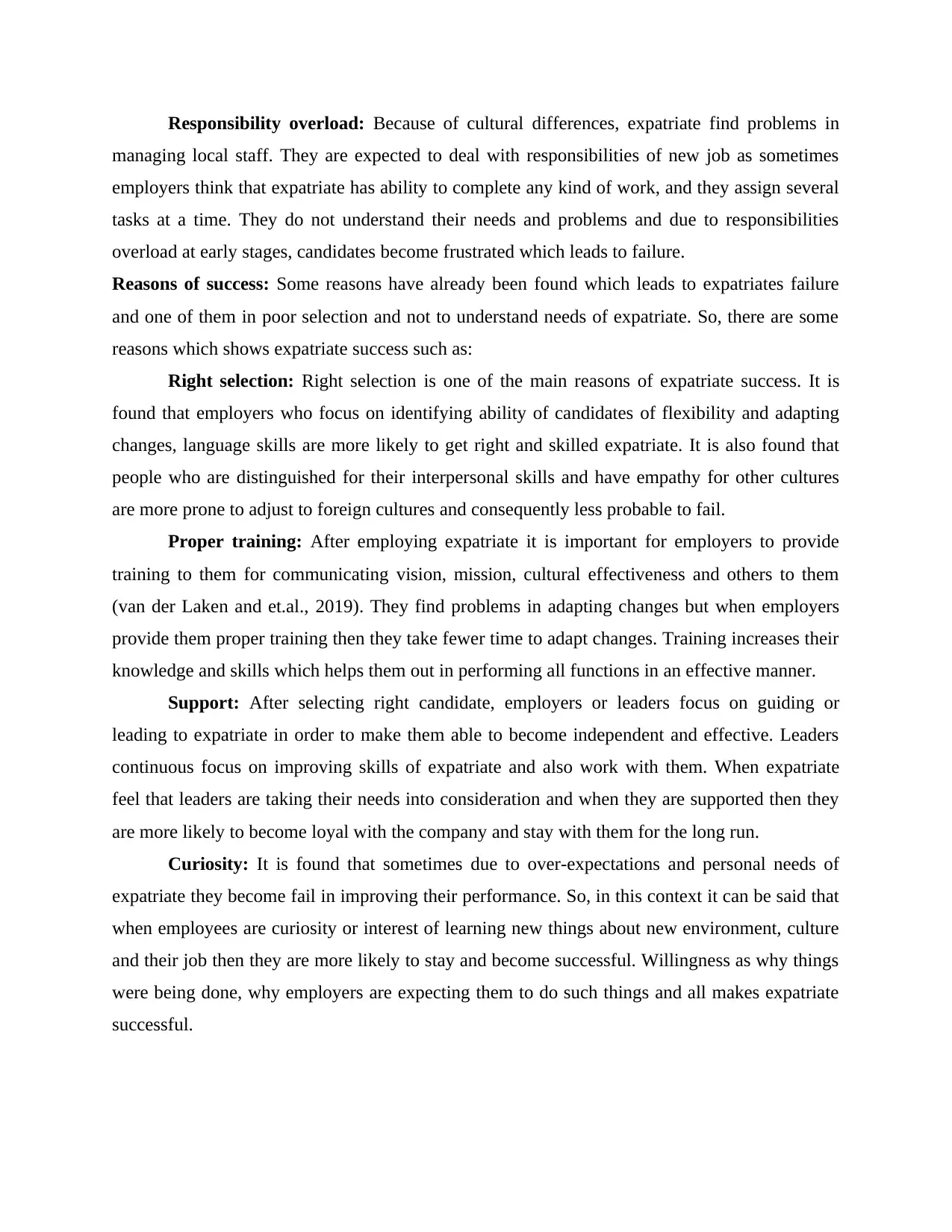
Responsibility overload: Because of cultural differences, expatriate find problems in
managing local staff. They are expected to deal with responsibilities of new job as sometimes
employers think that expatriate has ability to complete any kind of work, and they assign several
tasks at a time. They do not understand their needs and problems and due to responsibilities
overload at early stages, candidates become frustrated which leads to failure.
Reasons of success: Some reasons have already been found which leads to expatriates failure
and one of them in poor selection and not to understand needs of expatriate. So, there are some
reasons which shows expatriate success such as:
Right selection: Right selection is one of the main reasons of expatriate success. It is
found that employers who focus on identifying ability of candidates of flexibility and adapting
changes, language skills are more likely to get right and skilled expatriate. It is also found that
people who are distinguished for their interpersonal skills and have empathy for other cultures
are more prone to adjust to foreign cultures and consequently less probable to fail.
Proper training: After employing expatriate it is important for employers to provide
training to them for communicating vision, mission, cultural effectiveness and others to them
(van der Laken and et.al., 2019). They find problems in adapting changes but when employers
provide them proper training then they take fewer time to adapt changes. Training increases their
knowledge and skills which helps them out in performing all functions in an effective manner.
Support: After selecting right candidate, employers or leaders focus on guiding or
leading to expatriate in order to make them able to become independent and effective. Leaders
continuous focus on improving skills of expatriate and also work with them. When expatriate
feel that leaders are taking their needs into consideration and when they are supported then they
are more likely to become loyal with the company and stay with them for the long run.
Curiosity: It is found that sometimes due to over-expectations and personal needs of
expatriate they become fail in improving their performance. So, in this context it can be said that
when employees are curiosity or interest of learning new things about new environment, culture
and their job then they are more likely to stay and become successful. Willingness as why things
were being done, why employers are expecting them to do such things and all makes expatriate
successful.
managing local staff. They are expected to deal with responsibilities of new job as sometimes
employers think that expatriate has ability to complete any kind of work, and they assign several
tasks at a time. They do not understand their needs and problems and due to responsibilities
overload at early stages, candidates become frustrated which leads to failure.
Reasons of success: Some reasons have already been found which leads to expatriates failure
and one of them in poor selection and not to understand needs of expatriate. So, there are some
reasons which shows expatriate success such as:
Right selection: Right selection is one of the main reasons of expatriate success. It is
found that employers who focus on identifying ability of candidates of flexibility and adapting
changes, language skills are more likely to get right and skilled expatriate. It is also found that
people who are distinguished for their interpersonal skills and have empathy for other cultures
are more prone to adjust to foreign cultures and consequently less probable to fail.
Proper training: After employing expatriate it is important for employers to provide
training to them for communicating vision, mission, cultural effectiveness and others to them
(van der Laken and et.al., 2019). They find problems in adapting changes but when employers
provide them proper training then they take fewer time to adapt changes. Training increases their
knowledge and skills which helps them out in performing all functions in an effective manner.
Support: After selecting right candidate, employers or leaders focus on guiding or
leading to expatriate in order to make them able to become independent and effective. Leaders
continuous focus on improving skills of expatriate and also work with them. When expatriate
feel that leaders are taking their needs into consideration and when they are supported then they
are more likely to become loyal with the company and stay with them for the long run.
Curiosity: It is found that sometimes due to over-expectations and personal needs of
expatriate they become fail in improving their performance. So, in this context it can be said that
when employees are curiosity or interest of learning new things about new environment, culture
and their job then they are more likely to stay and become successful. Willingness as why things
were being done, why employers are expecting them to do such things and all makes expatriate
successful.
Paraphrase This Document
Need a fresh take? Get an instant paraphrase of this document with our AI Paraphraser
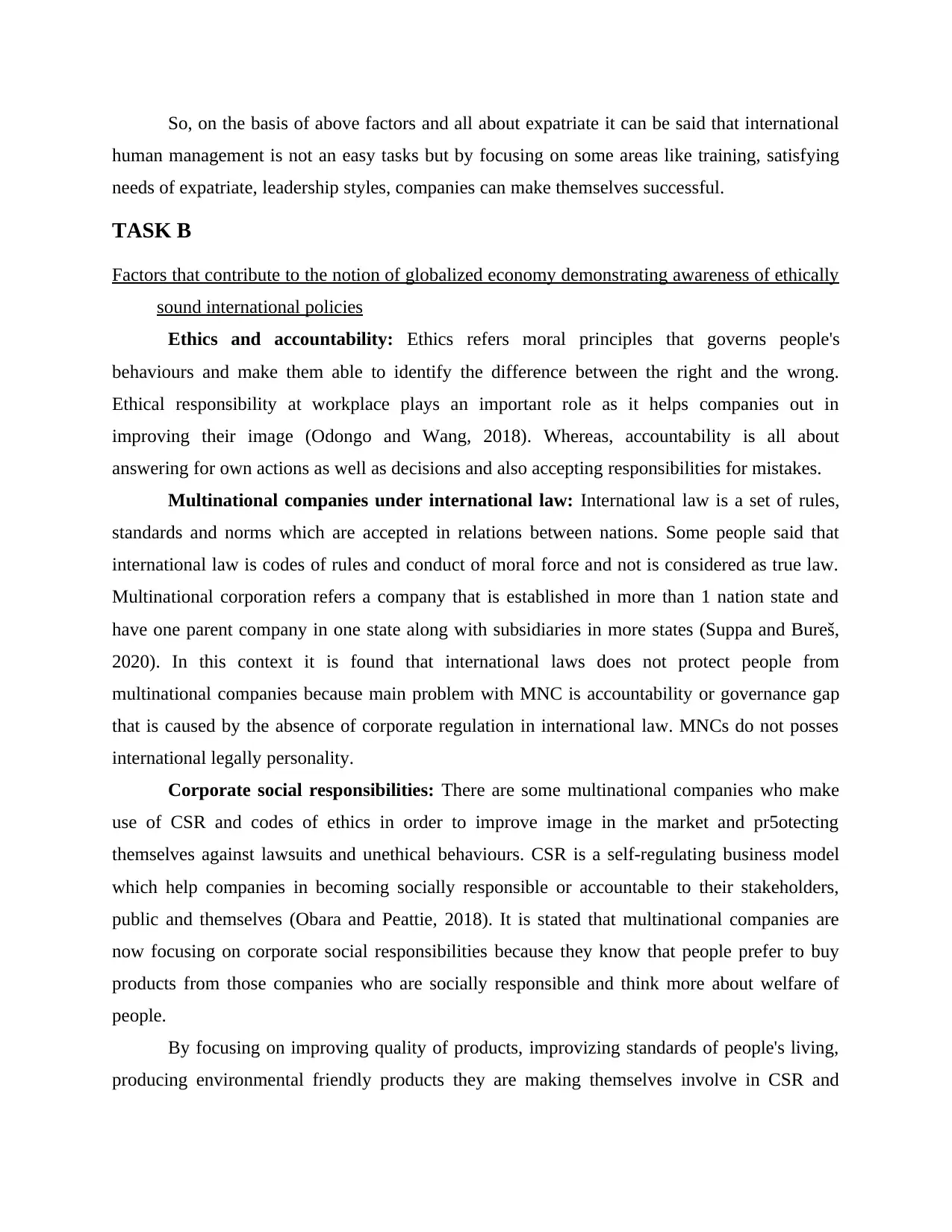
So, on the basis of above factors and all about expatriate it can be said that international
human management is not an easy tasks but by focusing on some areas like training, satisfying
needs of expatriate, leadership styles, companies can make themselves successful.
TASK B
Factors that contribute to the notion of globalized economy demonstrating awareness of ethically
sound international policies
Ethics and accountability: Ethics refers moral principles that governs people's
behaviours and make them able to identify the difference between the right and the wrong.
Ethical responsibility at workplace plays an important role as it helps companies out in
improving their image (Odongo and Wang, 2018). Whereas, accountability is all about
answering for own actions as well as decisions and also accepting responsibilities for mistakes.
Multinational companies under international law: International law is a set of rules,
standards and norms which are accepted in relations between nations. Some people said that
international law is codes of rules and conduct of moral force and not is considered as true law.
Multinational corporation refers a company that is established in more than 1 nation state and
have one parent company in one state along with subsidiaries in more states (Suppa and Bureš,
2020). In this context it is found that international laws does not protect people from
multinational companies because main problem with MNC is accountability or governance gap
that is caused by the absence of corporate regulation in international law. MNCs do not posses
international legally personality.
Corporate social responsibilities: There are some multinational companies who make
use of CSR and codes of ethics in order to improve image in the market and pr5otecting
themselves against lawsuits and unethical behaviours. CSR is a self-regulating business model
which help companies in becoming socially responsible or accountable to their stakeholders,
public and themselves (Obara and Peattie, 2018). It is stated that multinational companies are
now focusing on corporate social responsibilities because they know that people prefer to buy
products from those companies who are socially responsible and think more about welfare of
people.
By focusing on improving quality of products, improvizing standards of people's living,
producing environmental friendly products they are making themselves involve in CSR and
human management is not an easy tasks but by focusing on some areas like training, satisfying
needs of expatriate, leadership styles, companies can make themselves successful.
TASK B
Factors that contribute to the notion of globalized economy demonstrating awareness of ethically
sound international policies
Ethics and accountability: Ethics refers moral principles that governs people's
behaviours and make them able to identify the difference between the right and the wrong.
Ethical responsibility at workplace plays an important role as it helps companies out in
improving their image (Odongo and Wang, 2018). Whereas, accountability is all about
answering for own actions as well as decisions and also accepting responsibilities for mistakes.
Multinational companies under international law: International law is a set of rules,
standards and norms which are accepted in relations between nations. Some people said that
international law is codes of rules and conduct of moral force and not is considered as true law.
Multinational corporation refers a company that is established in more than 1 nation state and
have one parent company in one state along with subsidiaries in more states (Suppa and Bureš,
2020). In this context it is found that international laws does not protect people from
multinational companies because main problem with MNC is accountability or governance gap
that is caused by the absence of corporate regulation in international law. MNCs do not posses
international legally personality.
Corporate social responsibilities: There are some multinational companies who make
use of CSR and codes of ethics in order to improve image in the market and pr5otecting
themselves against lawsuits and unethical behaviours. CSR is a self-regulating business model
which help companies in becoming socially responsible or accountable to their stakeholders,
public and themselves (Obara and Peattie, 2018). It is stated that multinational companies are
now focusing on corporate social responsibilities because they know that people prefer to buy
products from those companies who are socially responsible and think more about welfare of
people.
By focusing on improving quality of products, improvizing standards of people's living,
producing environmental friendly products they are making themselves involve in CSR and
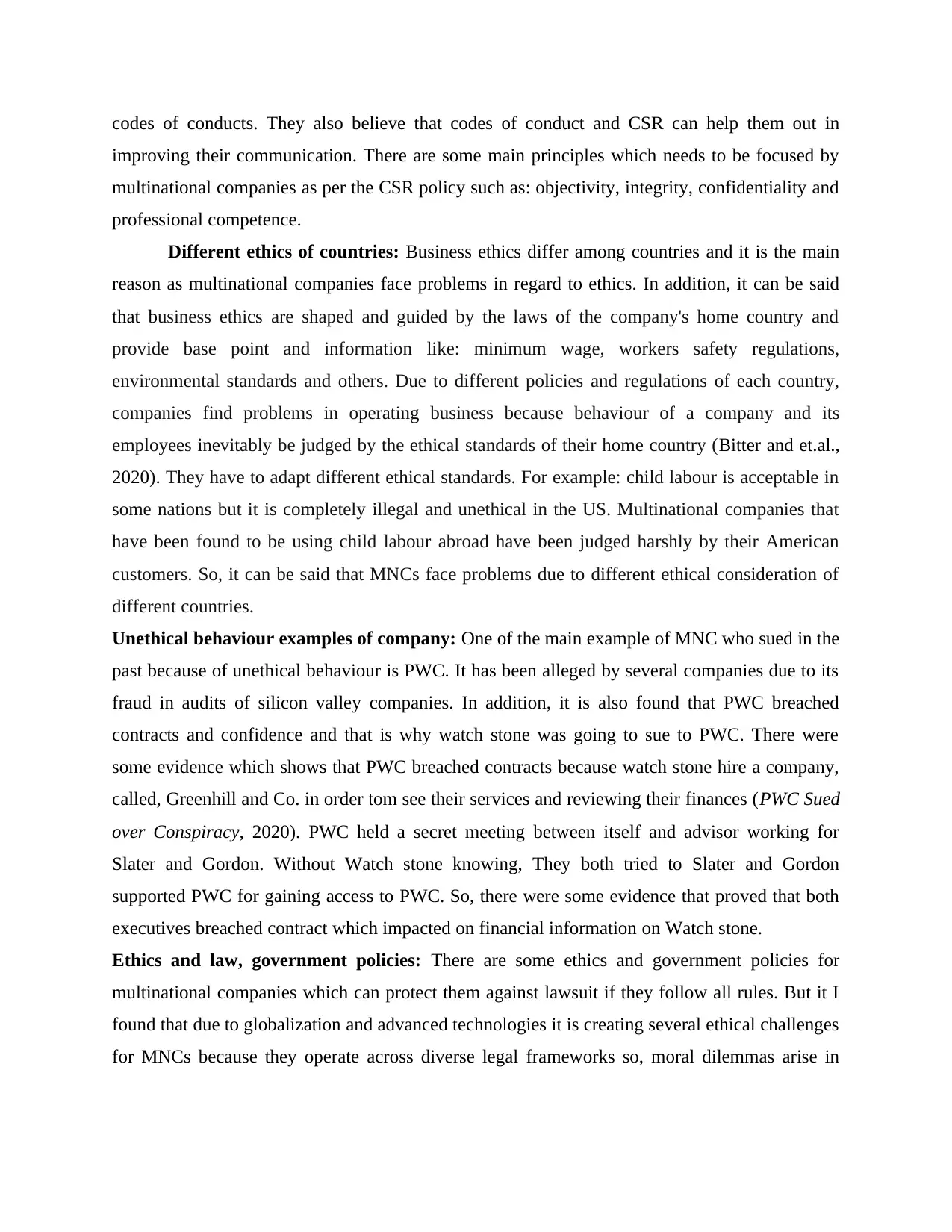
codes of conducts. They also believe that codes of conduct and CSR can help them out in
improving their communication. There are some main principles which needs to be focused by
multinational companies as per the CSR policy such as: objectivity, integrity, confidentiality and
professional competence.
Different ethics of countries: Business ethics differ among countries and it is the main
reason as multinational companies face problems in regard to ethics. In addition, it can be said
that business ethics are shaped and guided by the laws of the company's home country and
provide base point and information like: minimum wage, workers safety regulations,
environmental standards and others. Due to different policies and regulations of each country,
companies find problems in operating business because behaviour of a company and its
employees inevitably be judged by the ethical standards of their home country (Bitter and et.al.,
2020). They have to adapt different ethical standards. For example: child labour is acceptable in
some nations but it is completely illegal and unethical in the US. Multinational companies that
have been found to be using child labour abroad have been judged harshly by their American
customers. So, it can be said that MNCs face problems due to different ethical consideration of
different countries.
Unethical behaviour examples of company: One of the main example of MNC who sued in the
past because of unethical behaviour is PWC. It has been alleged by several companies due to its
fraud in audits of silicon valley companies. In addition, it is also found that PWC breached
contracts and confidence and that is why watch stone was going to sue to PWC. There were
some evidence which shows that PWC breached contracts because watch stone hire a company,
called, Greenhill and Co. in order tom see their services and reviewing their finances (PWC Sued
over Conspiracy, 2020). PWC held a secret meeting between itself and advisor working for
Slater and Gordon. Without Watch stone knowing, They both tried to Slater and Gordon
supported PWC for gaining access to PWC. So, there were some evidence that proved that both
executives breached contract which impacted on financial information on Watch stone.
Ethics and law, government policies: There are some ethics and government policies for
multinational companies which can protect them against lawsuit if they follow all rules. But it I
found that due to globalization and advanced technologies it is creating several ethical challenges
for MNCs because they operate across diverse legal frameworks so, moral dilemmas arise in
improving their communication. There are some main principles which needs to be focused by
multinational companies as per the CSR policy such as: objectivity, integrity, confidentiality and
professional competence.
Different ethics of countries: Business ethics differ among countries and it is the main
reason as multinational companies face problems in regard to ethics. In addition, it can be said
that business ethics are shaped and guided by the laws of the company's home country and
provide base point and information like: minimum wage, workers safety regulations,
environmental standards and others. Due to different policies and regulations of each country,
companies find problems in operating business because behaviour of a company and its
employees inevitably be judged by the ethical standards of their home country (Bitter and et.al.,
2020). They have to adapt different ethical standards. For example: child labour is acceptable in
some nations but it is completely illegal and unethical in the US. Multinational companies that
have been found to be using child labour abroad have been judged harshly by their American
customers. So, it can be said that MNCs face problems due to different ethical consideration of
different countries.
Unethical behaviour examples of company: One of the main example of MNC who sued in the
past because of unethical behaviour is PWC. It has been alleged by several companies due to its
fraud in audits of silicon valley companies. In addition, it is also found that PWC breached
contracts and confidence and that is why watch stone was going to sue to PWC. There were
some evidence which shows that PWC breached contracts because watch stone hire a company,
called, Greenhill and Co. in order tom see their services and reviewing their finances (PWC Sued
over Conspiracy, 2020). PWC held a secret meeting between itself and advisor working for
Slater and Gordon. Without Watch stone knowing, They both tried to Slater and Gordon
supported PWC for gaining access to PWC. So, there were some evidence that proved that both
executives breached contract which impacted on financial information on Watch stone.
Ethics and law, government policies: There are some ethics and government policies for
multinational companies which can protect them against lawsuit if they follow all rules. But it I
found that due to globalization and advanced technologies it is creating several ethical challenges
for MNCs because they operate across diverse legal frameworks so, moral dilemmas arise in
⊘ This is a preview!⊘
Do you want full access?
Subscribe today to unlock all pages.

Trusted by 1+ million students worldwide
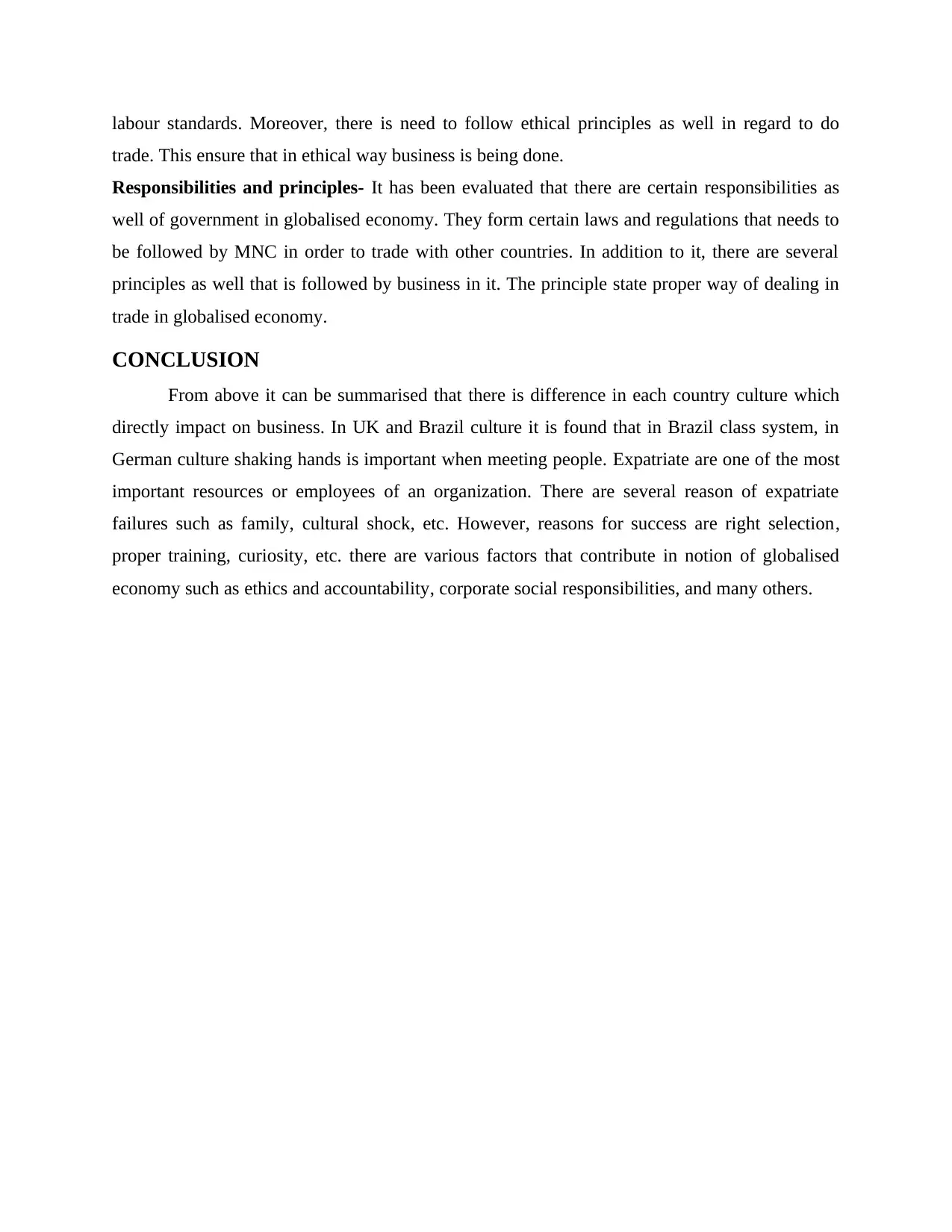
labour standards. Moreover, there is need to follow ethical principles as well in regard to do
trade. This ensure that in ethical way business is being done.
Responsibilities and principles- It has been evaluated that there are certain responsibilities as
well of government in globalised economy. They form certain laws and regulations that needs to
be followed by MNC in order to trade with other countries. In addition to it, there are several
principles as well that is followed by business in it. The principle state proper way of dealing in
trade in globalised economy.
CONCLUSION
From above it can be summarised that there is difference in each country culture which
directly impact on business. In UK and Brazil culture it is found that in Brazil class system, in
German culture shaking hands is important when meeting people. Expatriate are one of the most
important resources or employees of an organization. There are several reason of expatriate
failures such as family, cultural shock, etc. However, reasons for success are right selection,
proper training, curiosity, etc. there are various factors that contribute in notion of globalised
economy such as ethics and accountability, corporate social responsibilities, and many others.
trade. This ensure that in ethical way business is being done.
Responsibilities and principles- It has been evaluated that there are certain responsibilities as
well of government in globalised economy. They form certain laws and regulations that needs to
be followed by MNC in order to trade with other countries. In addition to it, there are several
principles as well that is followed by business in it. The principle state proper way of dealing in
trade in globalised economy.
CONCLUSION
From above it can be summarised that there is difference in each country culture which
directly impact on business. In UK and Brazil culture it is found that in Brazil class system, in
German culture shaking hands is important when meeting people. Expatriate are one of the most
important resources or employees of an organization. There are several reason of expatriate
failures such as family, cultural shock, etc. However, reasons for success are right selection,
proper training, curiosity, etc. there are various factors that contribute in notion of globalised
economy such as ethics and accountability, corporate social responsibilities, and many others.
Paraphrase This Document
Need a fresh take? Get an instant paraphrase of this document with our AI Paraphraser
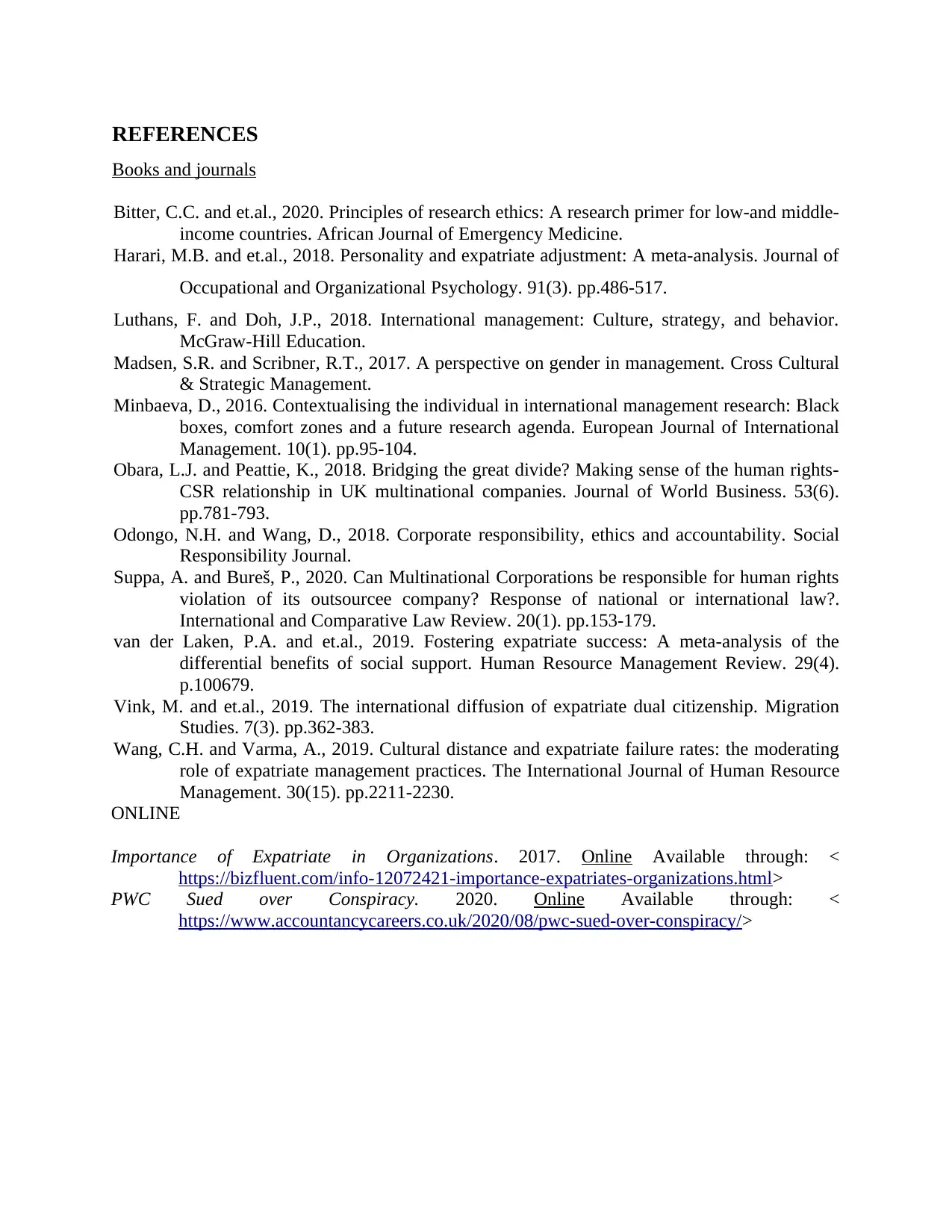
REFERENCES
Books and journals
Bitter, C.C. and et.al., 2020. Principles of research ethics: A research primer for low-and middle-
income countries. African Journal of Emergency Medicine.
Harari, M.B. and et.al., 2018. Personality and expatriate adjustment: A meta‐analysis. Journal of
Occupational and Organizational Psychology. 91(3). pp.486-517.
Luthans, F. and Doh, J.P., 2018. International management: Culture, strategy, and behavior.
McGraw-Hill Education.
Madsen, S.R. and Scribner, R.T., 2017. A perspective on gender in management. Cross Cultural
& Strategic Management.
Minbaeva, D., 2016. Contextualising the individual in international management research: Black
boxes, comfort zones and a future research agenda. European Journal of International
Management. 10(1). pp.95-104.
Obara, L.J. and Peattie, K., 2018. Bridging the great divide? Making sense of the human rights-
CSR relationship in UK multinational companies. Journal of World Business. 53(6).
pp.781-793.
Odongo, N.H. and Wang, D., 2018. Corporate responsibility, ethics and accountability. Social
Responsibility Journal.
Suppa, A. and Bureš, P., 2020. Can Multinational Corporations be responsible for human rights
violation of its outsourcee company? Response of national or international law?.
International and Comparative Law Review. 20(1). pp.153-179.
van der Laken, P.A. and et.al., 2019. Fostering expatriate success: A meta-analysis of the
differential benefits of social support. Human Resource Management Review. 29(4).
p.100679.
Vink, M. and et.al., 2019. The international diffusion of expatriate dual citizenship. Migration
Studies. 7(3). pp.362-383.
Wang, C.H. and Varma, A., 2019. Cultural distance and expatriate failure rates: the moderating
role of expatriate management practices. The International Journal of Human Resource
Management. 30(15). pp.2211-2230.
ONLINE
Importance of Expatriate in Organizations. 2017. Online Available through: <
https://bizfluent.com/info-12072421-importance-expatriates-organizations.html>
PWC Sued over Conspiracy. 2020. Online Available through: <
https://www.accountancycareers.co.uk/2020/08/pwc-sued-over-conspiracy/>
Books and journals
Bitter, C.C. and et.al., 2020. Principles of research ethics: A research primer for low-and middle-
income countries. African Journal of Emergency Medicine.
Harari, M.B. and et.al., 2018. Personality and expatriate adjustment: A meta‐analysis. Journal of
Occupational and Organizational Psychology. 91(3). pp.486-517.
Luthans, F. and Doh, J.P., 2018. International management: Culture, strategy, and behavior.
McGraw-Hill Education.
Madsen, S.R. and Scribner, R.T., 2017. A perspective on gender in management. Cross Cultural
& Strategic Management.
Minbaeva, D., 2016. Contextualising the individual in international management research: Black
boxes, comfort zones and a future research agenda. European Journal of International
Management. 10(1). pp.95-104.
Obara, L.J. and Peattie, K., 2018. Bridging the great divide? Making sense of the human rights-
CSR relationship in UK multinational companies. Journal of World Business. 53(6).
pp.781-793.
Odongo, N.H. and Wang, D., 2018. Corporate responsibility, ethics and accountability. Social
Responsibility Journal.
Suppa, A. and Bureš, P., 2020. Can Multinational Corporations be responsible for human rights
violation of its outsourcee company? Response of national or international law?.
International and Comparative Law Review. 20(1). pp.153-179.
van der Laken, P.A. and et.al., 2019. Fostering expatriate success: A meta-analysis of the
differential benefits of social support. Human Resource Management Review. 29(4).
p.100679.
Vink, M. and et.al., 2019. The international diffusion of expatriate dual citizenship. Migration
Studies. 7(3). pp.362-383.
Wang, C.H. and Varma, A., 2019. Cultural distance and expatriate failure rates: the moderating
role of expatriate management practices. The International Journal of Human Resource
Management. 30(15). pp.2211-2230.
ONLINE
Importance of Expatriate in Organizations. 2017. Online Available through: <
https://bizfluent.com/info-12072421-importance-expatriates-organizations.html>
PWC Sued over Conspiracy. 2020. Online Available through: <
https://www.accountancycareers.co.uk/2020/08/pwc-sued-over-conspiracy/>

⊘ This is a preview!⊘
Do you want full access?
Subscribe today to unlock all pages.

Trusted by 1+ million students worldwide
1 out of 12
Related Documents
Your All-in-One AI-Powered Toolkit for Academic Success.
+13062052269
info@desklib.com
Available 24*7 on WhatsApp / Email
![[object Object]](/_next/static/media/star-bottom.7253800d.svg)
Unlock your academic potential
Copyright © 2020–2026 A2Z Services. All Rights Reserved. Developed and managed by ZUCOL.




